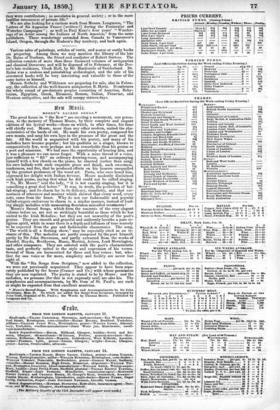3Lm 1gusir.
:HOGUE'S SACRED SONGS.
The great house in "the Row" are erecting a monument, me peren- nius, to the memory of Thomas Moore, by their complete and elegant editions of his lyrical works-those on which, in after times his fame will chiefly rest. Moore, more than any other modern, united the cha- racteristics of the bards of old. He made his own poetry, composed his own music, and sang his own lays in the presence of the great and the fair. All the world is acquainted with his poetry, and many of his melodies have become popular ; but his qualities as a singer, known to comparatively few, were perhaps not less remarkable than his genius as a poet and musician. We had once the opportunity of hearing him, and it was a pleasure we can never forget. With a mere thread of a voice, just sufficient to "fill" an ordinary drawing-room, and accompanying 'himself with a few chords on the piano, he chanted (rather than sang) his own ballads with such exquisite grace and finish, such sweetness, tenderness, and fire, that he produced effects on his hearers unequalled hy the greatest professors of the vocal art. Pasta, who once heard him, expressed her delight with Italian fervour. Moore modestly disclaimed such high praise, saying that v(hat he did could not be called singing. "No, Mr. Moore," said the lady, "it is not exactly singing, but it is something a great deal better." It was, in truth, the perfection of bal- led-singing; and it charm lay in its delicacy, simplicity, and that ear- nestness of utterance and manner which showed that every wore, every note, came from the heart. Why do not our fashionable and popular ballad-singers endeavour to charm in a similar manner, instead of load- ing simple melodies with unmeaning flonrishes miscalled ornankents ?
Moore's Sacred Songs, which form the contents of the very elegant volume before us, are not so strikingly beautiful as those which he has united to the Irish Melodies; but they are not unworthy of the poet's genius. They are smooth and graceful and uniformly breathe a pure re- ligious spirit, while in some there is a depth and loftiness of tone scarcely to be expected from the gay and fashionable chansonnier. The song, "The world is all a fleeting show," may be especially cited as an in- stance of this. The melodies are partly composed by the poet himself, partly by Sir John Stevenson, and partly extracted from the works of Handel, Haydn, Beethoven, Kasse, Martini, AV113011, Lord Mornington, and other composers. They are selected with the poet's characteristic taste, and perfectly suited to the style and expression of his verses. Several of them are harmonized for three and four voices : but, whe- ther for one voice or for more, simplicity and facility are never lost sight of.
With the "Sin Sown from Scripture," now added to the collection, we were not previously acquainted. They appear to have been sepa- rately published by the house (Cramer and Co.) with whose permission they are now reprinted. The poetry is stated to be by Moore : and the melodies, we presume (for this is not expressly said) are also his. The symphonies and accompaniments, by Mr. Goss of St. Paul's, are such as might be expected from that excellent musician.
Moores Sacred Songs. With Symphonies and Accompaniments by Sir John Stevenson, Mug. D. To which are added Six Songs from Scripture, amsuged by John Goss, Organist of St. Paul's ; the Words by Thomas Moore. Published by Longman and Co.


























 Previous page
Previous page